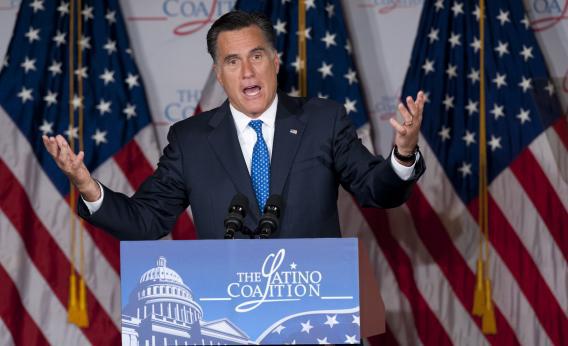If the federal government offered you some free money to buy supplemental education services for your kid, you’d take the money right? After all, why not? That’s common sense, but it also adds up to a huge bomb lurking inside the education policy white paper released by the Romney campaign yesterday (PDF).
The basic idea of Romney’s thinking on K-12 education is to walk away from the standards-and-accountability approach that’s dominated in both the Bush and Obama administrations and double down on the choice thread of reform. Romney’s white paper also doesn’t say anything about levels of federal education spending, but given his overall budget commitments this is likely a big difference between his approach and Obama’s. But in structural terms, most of Romney’s choice proposals are only incrementally different from trends over the past decade. Obama created a pool of bonus “race to the top” federal school funding that states could get by, among other things, eliminating caps on the quantity of charter schools they allow. Romney wants to make such elimination necessary for states to get core Title I and IDEA federal education dollars. That’s a more robust version of what Obama’s been doing. Romney wants to take the existing federal Charter School Grant Program which gives money to state departments of education to build our charter networks and make charter operators eligible for direct federal funding. Romney also wants to ensure that Title I and IDEA education dollars can “follow the child” into a charter school or (in states where it’s allowed) private school. These are all big ideas but, again, as I say they’re largely continuous with the direction policy has been taking for a while.
But then there’s this: “Eligible students remaining in public schools will also have the option to use federal funds to purchase supplemental tutoring or digital courses from state-approved private providers rather than receiving Title I services from their district.”
I wasn’t sure what this meant since students don’t receive individualized “Title I services” from their school district. The Title I formula just basically hands money to school districts and helps finance the general operation of local public schools. When I inquired the Romney campaign confirmed to me that what this means is that families could get money from the federal government to purchase supplemental tutoring and as a consequence their public school’s overall budget would be reduced. Since the money comes to your family in one giant lump but the cuts are spread out across the entire school, there’s basically no reason not to put in for the cash-out.
For on-the-ball parents, this should work out fine. Having each family shop separately for education services sounds pretty inefficient, but well-organized families will probably team up to buy some small group lessons or whatever. It’ll be an extra hassle to shoulder additional responsibilities in this regard, but some people will appreciate the extra flexibility and one way or another people will do what they have to do for their kids. But the kind of kids who are worst-served by the existing school system—kids experiencing family disruption and who low-income and often poorly educated parents themselves—are going to be very poorly served by this idea. Neither a single mom who dropped out of high school and is trying to raise three kids on a minimum wage job, nor a pair of Mexican immigrants with no English literacy are going to do a great job of hiring an algebra tutor for their children. The overall Romney budget framework implies such a steep drop in per student Title I and IDEA money one way or another that the specific details of how he’d dole it out are less relevant than they might otherwise be, but the basic concept here seems almost willfully indifferent to the problems facing low-socioeconomic status families. At the same time, union allies who’ve spent the past ten years arguing that in-school factors aren’t important to kids’ educational outcomes are arguably being hoisted on their own petard here. To an extent, the edu-left has been arguing that it’s not reasonable to expect public schools to get good outcomes out of troubled kids and now Romney’s arrived with a plan that will in fact give up on that aspiration.
